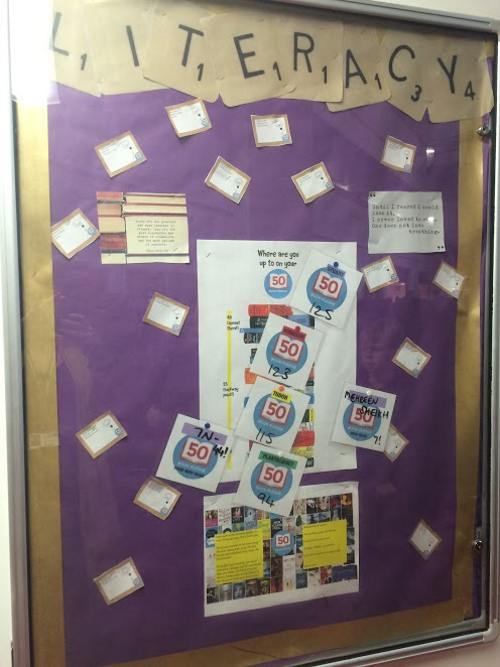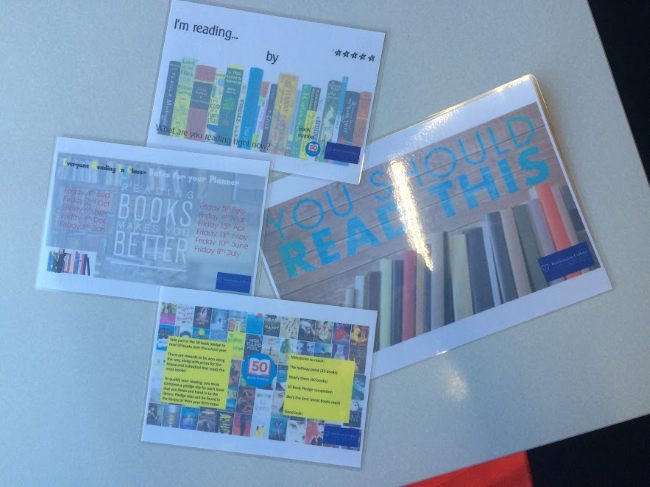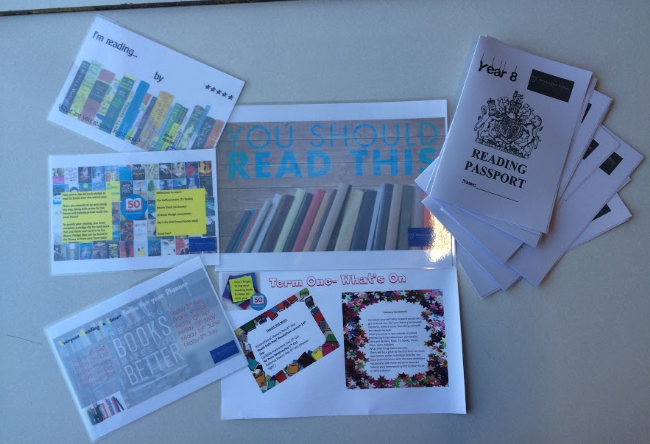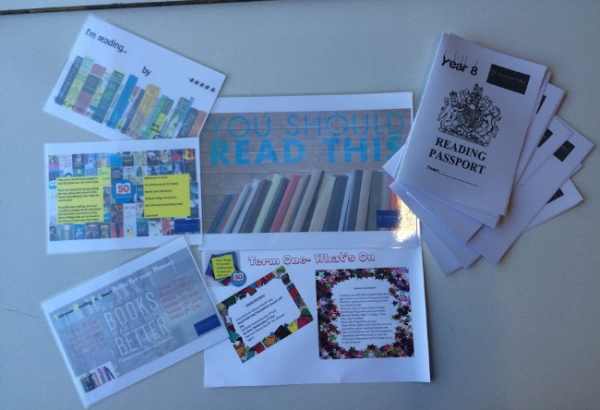Here are a few handy, sustainable ways of ensuring that Literacy remains visible and valuable within your school network.
Get everyone reading
Start with your staff base. Everyone reads, but we are not always forthcoming about it or even notice when we are reading. Keep a track of the times that you use "Students keep a record of their books read on a record sheet, and we use library loan records to monitor figures."reading during your working day; does that not emphasise how important it is that students use the luxury of time within school to develop reading skills before they reach the workplace? A large proportion of children read material based on a recommendation from an adult role model - this could be at home or school.
With this in mind, it is paramount that as teachers, we lead by example and motivate students to read. Male teachers offer a critical role here - so make them your priority for reading posters, and encourage regular, sustained opportunities to discuss reading in class. Starting points for this include all staff displaying what they are currently reading, alongside whole-school reading events (we have Everyone Reading in Class, but another version seen is Drop Everything And Read) that encourage discussions around reading between pupils and staff.

Pledge To Read
For the first year, we are partaking in an incentive called Fifty Book Pledge which is quite simply that; to read fifty books. After setting myself the task three years ago (and JUST hitting my quota by the end of December), I realised the possibilities of running such an incentive within school. Students keep a record of their books read on a record sheet, and we use library loan records to monitor figures. This means that students are more likely to request books from the library or recommend new purchases, and so guarantees that you stock for your customer.
The competition is then run with rewards for particular milestones (to avoid the risk of only a pocket of your student body maintaining the motivation throughout the school year) and achievement is also linked to house points for the house with the most books read. Staff get involved too, of course. Teachers have created form displays to ‘beat the teacher;’ others have commented that the Pledge has been the catalyst for discussion within form time. How do we know they have read a book? We don’t, but the library has been heaving and people are talking books, so I think it is safe to hedge our bets that words are being suitably digested.

Breed Literacy from the Inside Out
You have a ready made team to develop and drive literacy within your school: the students! Formalise roles within your student body for people to coordinate and champion literacy for you; peer power is an incredibly powerful element to drive forward any whole-school incentive. Literacy ambassadors can organise whole-school events, help to operate and embed ideas within the library and, most importantly, give literacy a student voice.
Using the same approach from your higher year groups will again enforce a real presence to reading within the school body - mentoring roles. Take your older students through a formal application and interview process (PERFECT for career guidance and preparatory steps before college or university interviews) before taking students through a structured training programme to become trained mentors. Publicly congratulate students upon successful appointment, display mentor names in a public area in school; they are going to be a vital part of improving the abundance of literacy.
The mentors can then work with your specific priority groups throughout the academic year. This not only improves academic progress, but also assists with the development of a love for reading that for whatever reason has passed particular students by as they have made their way through Primary or Secondary education. With some students it is simply a case of learning how to choose a book - they have never navigated a library and don’t know where to begin. Others will have abandoned reading as a result of quite possibly a negative association that they have made within a lesson once; reading can be rather an emotional process to many children. Having a peer group to provide not only a regular reading opportunity in a safe, non-judgemental setting will be a really enriching experience to those less confident children.

Secret Doses of Literacy
Sneaking literacy into every outlet of school life is a real skill and, as you would expect, relatively easy to disguise as fun! Provide students with opportunities to experience a multitude of literature- how can they develop a love for something if they don’t know what it is? Stock classrooms with newspapers, invite in poets and authors, host a variety of enrichment clubs to develop verbal and written literacy in such a way that students feel a sense of ownership. Film club, debating society, poetry club, book club, newsletter club, graphic novel club, creative writing club - your school literacy events calendar can essentially be dictated by the enrichment on offer. There are several writing and poetry competitions on offer to Secondary age children. The BBC support schools with fantastic resources for 500 WORDS, Writers’ Room, BBC School Report News Day - in addition to several other local and national organisations that help to develop literacy within young people.
Collaborate and Magpie
I am just one literacy coordinator in one school with one demographic and one student body. If you are going to do one thing, make it a priority to seek out other literacy coordinators in neighbouring schools or even further afield, and exchange ideas or resources. In the same way that we share fantastic teaching and learning concepts, literacy can only be strengthened if we do the same with ideas that stick within our own schools.
It was with this mind-set that I created Litdrive, a small but growing collaborative drive for staff coordinating literacy within their school. In my mind, the drive will become a collection of resources,"The drive will become a collection of resources, tasks, parent guidance and policies that could be used and developed over time." tasks, parent guidance and policies that could be used and developed over time throughout schools both nationally and worldwide. The process is really very simple: every time I make a literacy resource, it is stored on Litdrive, which means (at last count) over 60 other coordinators can view and download my resource. They can in turn upload their own materials and then at particular points over the year, we can review and share successes of impact from specific incentives run within our schools.
There is no quick win or secret ingredient for improving literacy within schools; we exist in a world where literacy has taken an entirely multi-modal shift and children are adapting as such. Ultimately, we need to do the same to keep literacy visible and valuable to our students.
How do you promote literacy in your school? Share your tips in the comments section below.


















